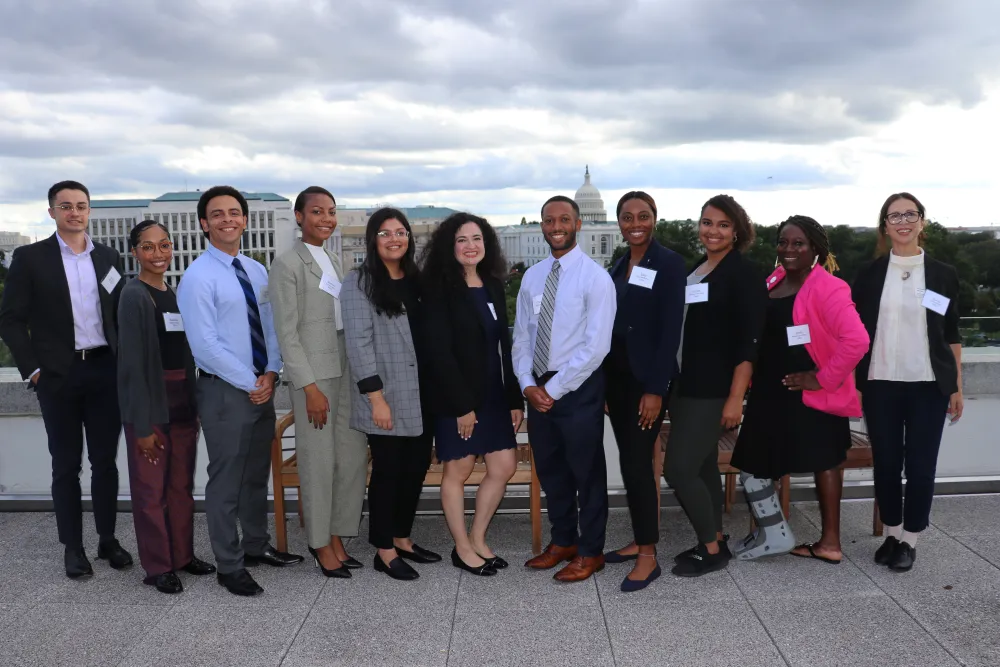A fair and impartial criminal justice system requires that all defendants have access to legal representation and other defense services. The Judiciary ensures that the Sixth Amendment right to counsel and the rights provided under the Criminal Justice Act are protected through the work of dedicated federal defenders and panel attorneys.
Federal Defender Fellowship Program

Eleven of the fellows participating in the inaugural program aimed at fostering diversity in the ranks of federal defenders visited the Thurgood Marshall Federal Judiciary Building in Washington, D.C. in 2022.
Left to right: Kyle Kent, Madeline Nelson, Zachary Parrish, Success Carter, Summer Akhtar, MariaCarolina Gomez Gonzales, Christopher Meadows, Aziza Hawthorne, Ashlynn Rotta Mejia, Ayisha Scales-Bruce, and Dorna Khazeni.
An inaugural group of 14 lawyers joined federal public defender offices around the country in 2022 as part of a fellowship program aimed at fostering diversity in the ranks of federal defenders.
Twelve fellows are being trained to work on non-capital cases, and two are learning to handle capital cases. With the fellowship program, the Judiciary hopes to establish a pipeline of diverse attorneys qualified to join federal defender offices and federal capital trial teams or to work as Criminal Justice Act (CJA) panel attorneys, who are private attorneys appointed by the federal courts to represent individuals without the means to retain counsel.
The program furthers cultural understanding, enhances the Judiciary’s ability to meet the needs of a diverse clientele, and builds confidence among clients and the public in the fairness of the justice system.
Applications for the non-capital positions opened in the fall of 2021, and fellows began their appointments in the second half of 2022.Information is available on the program’s website.
U.S. Capitol Breach Cases
The judicial and executive branches collaborated in 2022 to find effective strategies for dealing with the massive amount of discoverable evidence involved in the criminal cases arising from the Jan. 6, 2021, breach of the U.S. Capitol building by protesters. The two branches of government are also working together on issues arising from the remote detention of hundreds of the defendants.
The protest at the Capitol resulted in the largest federal prosecution in the nation’s history, both in the number of defendants prosecuted and the volume of the evidence. More than 900 individuals across the nation face criminal charges related to the breach, ranging from trespass and theft to assault on law enforcement officers and conspiracy. Many of them have relied for their defense on federal defenders or CJA panel attorneys.
About a third of the cases were resolved by November 2022. The Justice Department has estimated that 700 to 1,200 additional cases will be filed, many of which will be felonies.
The prosecutions involve an unprecedented volume of seized electronically stored information, including thousands of hours of surveillance and body-worn camera footage, social media, data from thousands of smartphones and other electronic devices, and materials from multiple law enforcement agencies.
To facilitate the efficient distribution of the materials — which must be available to both the prosecution and the defense — the Department of Justice (DOJ) coordinated with the Administrative Office of the U.S. Courts's Defender Services National Litigation Support Team and the federal defender office in Washington, D.C., to provide access to a secure online discovery database that allows hundreds of legal defense teams to search, review, sort, and annotate files confidentially. Also, the DOJ is sharing with defense counsel more than 24,000 multimedia files — representing more than nine terabytes of information and 361 days’ worth of footage — through a separate repository managed by the National Litigation Support Team and the Washington, D.C., federal defender.
The collaboration between the two branches of government significantly reduced taxpayers’ costs related to the cases, created efficiencies, and aided in the administration of justice, according to the Defender Services Office.
The two branches also initiated discussions in 2022 aimed at solving problems related to the remote detention of hundreds of the defendants. Detaining defendants many miles from the federal courthouses where their cases are being heard raises substantial operational and cost issues as well as constitutional concerns about quality of representation, attorney access, and the defendants’ ability to meaningfully participate in their defense.
The newly formed AO/DOJ Remote Detention Working Group provides a forum for regular communication among stakeholders, including representatives from the Judicial Conference Committees on Criminal Law and Defender Services, the Office of the Deputy Attorney General, and the U.S. Marshals Service, as well as federal defenders, CJA panel attorneys, and probation and pretrial services officers. The working group held its first meeting in June 2022.
Meeting Increased Staffing Needs
In 2022, the Judiciary boosted the number of staff in federal defender organizations as a result of critical workloads in multiple court districts. An additional 134 federal defender positions, which were approved in the Judiciary’s fiscal year 2022 financial plan, were being filled throughout 2022 to help address workloads, establish a diversity fellowship program, support enhanced use of information technology, and provide litigation support in Oklahoma as a result of the caseload surge from the Supreme Court’s 2020 decision in McGirt v. Oklahoma.
Training for Federal Defenders and CJA Panel Attorneys
In fiscal year 2022, the Defender Services Office conducted 43 national training events for CJA panel attorneys, CJA providers, federal defenders, paralegals, investigators, and other staff. Twenty-three virtual programs, including 16 live webinars, were conducted, along with 20 in-person programs. Some training included substantive legal training in criminal law and procedure. Skills-based workshops covered topics including trial practice, electronic case management, legal writing, and sentencing mitigation. A federal defender leadership forum focused on office policies and leadership approaches.
Annual Report 2022
- Annual Report 2022
- Funding and Budget
- The Courts and Congress
- The Federal Bench
- Accountability and Resource Management
- Public Outreach and Communications
- Facilities and Security
- Court Operations
- Defender Services
- Probation and Pretrial Services
- Human Resources
- Information Systems and Cybersecurity
- Recent and Proposed Amendments to Federal Rules
- In Profile
